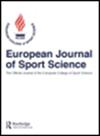完美主义与运动员对兴奋剂的态度:一个持续累积的荟萃分析和2 × 2模型的检验
IF 3
3区 医学
Q2 SPORT SCIENCES
引用次数: 7
摘要
完美主义可能促进非法和不可接受的行为,如兴奋剂。为了检验这个观点,在目前的研究中,我们有两个目的。首先,我们重新审视了完美主义与对兴奋剂的态度之间的关系,并在此过程中进行了不断累积的荟萃分析。其次,我们通过提供兴奋剂背景下完美主义的2 × 2模型的第一个测试,扩展了我们对这种关系的理解。181名大学运动员(平均年龄18.5岁)完成了完美主义(评估性关注完美主义[ECP]和个人标准完美主义[PSP])和对兴奋剂态度的测量。基于五项研究(包括本研究;N = 952)表明,ECP与兴奋剂态度呈显著的中小正相关(r + = .21),而PSP与兴奋剂态度呈不显著的小正相关(r + = .07)。此外,有调节回归分析为2 × 2模型的两个假设提供了支持。具体来说,纯ECP(高ECP,低PSP)比混合完美主义(高ECP,高PSP)和非完美主义(低ECP,低PSP)对兴奋剂的态度更有利。目前的研究结果表明,ECP是对兴奋剂态度的一个显著的正向预测因子,同时表现出高ECP和低PSP的运动员最有可能面临兴奋剂风险。因此,关注减少ECP可能是反兴奋剂教育项目的一个有价值的补充。本文章由计算机程序翻译,如有差异,请以英文原文为准。
Perfectionism and attitudes towards doping in athletes: A continuously cumulating meta-analysis and test of the 2 × 2 model
Abstract Perfectionism may promote engagement in illegal and unacceptable behaviours such as doping. To examine this idea, in the present study, we had two aims. First, we re-examined the relationship between perfectionism and attitudes towards doping and, in doing so, conducted a continuously cumulating meta-analysis. Second, we extended our understanding of this relationship by providing the first test of the 2 × 2 model of perfectionism in context of doping. A sample of 181 university athletes (mean age 18.5 years) completed measures of perfectionism (evaluative concerns perfectionism [ECP] and personal standards perfectionism [PSP]) and attitudes toward doping. A continuously cumulating meta-analysis based on five studies (including the present study; N = 952) indicated that ECP showed a significant small-to-medium positive relationship with attitudes towards doping (r + = .21), whereas PSP showed a nonsignificant small positive relationship with attitudes towards doping (r + = .07). In addition, moderated regression analysis provided support for two hypotheses of the 2 × 2 model. Specifically, pure ECP (high ECP, low PSP) was associated with more favourable attitudes towards doping than mixed perfectionism (high ECP, high PSP) and non-perfectionism (low ECP, low PSP). The present findings suggest that ECP is a significant positive predictor of attitudes towards doping and that athletes who exhibit a combination of high ECP and low PSP are the most likely to be at risk of doping. Consequently, a focus on reducing ECP may be a valuable addition to anti-doping education programmes.
求助全文
通过发布文献求助,成功后即可免费获取论文全文。
去求助
来源期刊
CiteScore
6.60
自引率
3.10%
发文量
153
审稿时长
6-12 weeks
期刊介绍:
The European Journal of Sport Science (EJSS) is the official Medline- and Thomson Reuters-listed journal of the European College of Sport Science. The editorial policy of the Journal pursues the multi-disciplinary aims of the College: to promote the highest standards of scientific study and scholarship in respect of the following fields: (a) Applied Sport Sciences; (b) Biomechanics and Motor Control; c) Physiology and Nutrition; (d) Psychology, Social Sciences and Humanities and (e) Sports and Exercise Medicine and Health.

 求助内容:
求助内容: 应助结果提醒方式:
应助结果提醒方式:


